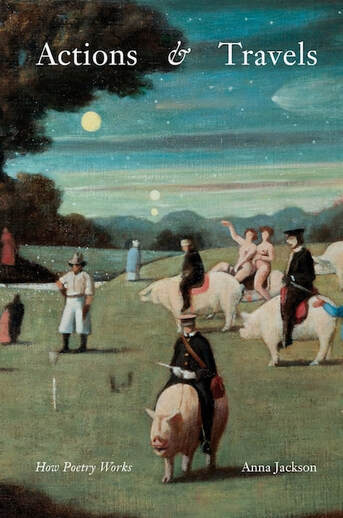
by Anna Jackson
Anna Jackson is obviously someone completely immersed in the world of poetry, being a published poet, as well as an academic with a DPhil from Oxford.
Her book Action & Travels appears quite a modest, even enigmatic, book; but nonetheless it is a piece of academic scholarship. And one has to say it is most suited to earnest undergraduate students in English literature. When I was a young student, stage 1 English turned out to be a bit bewildering, and that is how I feel about the book.
Action & Travels seems a bit of a vague title, even though based on a quote from a fellow academic poet, Anne Carson. The context for this is provided on page 69, where a poem is described as an ‘action of the mind’, and the reader is travelling through this action, and in a process of being transformed. In this particular chapter Jackson is talking about ‘sprawling’ poems, which have a real sense of movement, in the tradition of Walt Whitman and Allen Ginsberg. But these long, perhaps rambling and repetitive poems, are not really representative of the analysis in other chapters.
Indeed, the starting place is really in chapter 7, ‘conversations with past’, where the reader is taken back to the beginning in a very literal sense. This to the world of Ancient Greece and Rome, and the legendary female poet Sappho, and her first interpreter, the legendary male lyrical poet Catallus. Only fragments remain of the Sappho love poetry, but that didn’t stop Catallus and many more modern interpreters from adding to her slim body of work, or translating it in a modern context. These translators include the New Zealand poets Diane Harris, Janet Charman (who adds characters from a Katherine Mansfield short story), and C.K. Stead, who embellished the Catallus love triangle.
This chapter seems to be the most scholarly and complete. In fact the lengthy Sappho/Catullus interpretation comes in between the analysis of two dream poems, the first a good dream in Richard Wilbur’s ‘The Ride’, and then a nightmare in Mark Ford’s ‘Viewless Wings’. The latter title is interpreted through an analysis of John Keats’ ‘Ode to a Nightingale’. So, as well as traversing a lot of territory, and timeframes, stylistic diversity does not deter Anna Jackson’s analysis. However, the strategy might be better described as that of the ‘jump cut’, as film students would understand it.
So it is all a bit baffling in the end, unless one is familiar with at least some of the poets in each chapter. I’m somewhat familiar with Allen Ginsberg and his first collection Howl. Although the title comes from his most well-known poem, Jackson selects two other poems from that collection, ‘A Supermarket in California’ and ‘America’. Ginsberg’s ode to finding Whitman, a ‘lonely old grubber’, in a Californian supermarket, entails taking a metaphorical stroll through the “lost America of love.” Incidentally, the quoted sections of both Ginsberg poems have different line breaks to the originals.
Jackson provides some of the context to ‘beat’ poetry, if not the literature, but of course Whitman’s travels and sprawling lines were not the major inspirations. Ginsberg has referred to Whitman’s ‘adhesiveness’. But most of the inspiration for his breakthrough was in the ‘buddy’ interactions of Neal Cassady and Jack Kerouac, as they took joy rides across America. It might not be so obvious in the text, but it was all about their conversations, the rhythms of the words being like Bebop jazz. In Jackson’s version it is all about the ‘propulsion of anaphoria’, or the repetition of words in the lines.
It seems that how poetry works, according to Jackson, is really all about form and technique. That seems to be the way that creative writing is taught anyway. At the end of the book she adds a number of writing suggestions, based on the poems highlighted in each chapter, as well as some biographical notes on each poet, and book references. However, I still think that this book is meant primarily for the students, in the expectation that there is nothing new under the sun’ in poetry.
Author: Anna Jackson
Publisher: Auckland University Press
ISBN: 9781869409180
RRP: $35
Available: bookshops

 RSS Feed
RSS Feed
